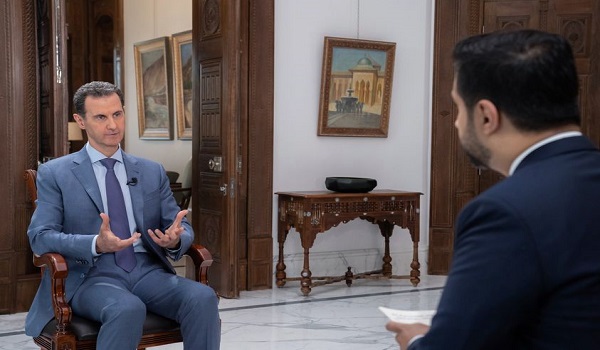President Al-Assad to Sky News Arabia: The parties that should be held responsible for destruction in Syria are those that supported terrorism and planned for the war
Damascus – President Bashar Al-Assad has stressed that destruction in Syria was caused by terrorism and the parties that should be held responsible for this destruction are those who supported terrorism and planned for the war.
In an interview with Sky News Arabia, President Al-Assad said “theoretically speaking, the war could have been avoided if we had submitted to all the demands that were imposed on Syria on different issues, foremost of which was giving up the Syrian rights and interests, however, practically speaking, we didn’t go in this direction”.
“Our goal was to defend Syria against terrorism and to defend Syria’s interests and independent decision. If we go back in time, we will adopt the same policy,” President Al-Assad clarified.
“We did not expect that the destruction will reach this extent, because we did not know what plans were prepared. We knew that something was being prepared for Syria, and we knew from the beginning that the war will be long, but no one expected the details,” the president went on to say.
He pointed out that the support provided by Russia and Iran, as friends of Syria, has been effective and has helped Syria withstand terrorism, “but friends can never replace us in the war and in steadfastness, the real steadfastness is that of the people”.
On the refugee issue, President Al-Assad said that around half a million refugees returned during the past years, and this return has stopped, due to the difficult living conditions, wondering how the refugees can return in the absence of water, electricity, schools for their children and healthcare, which are all among the basic necessities of life.
“For us, we have issued a decree that granted amnesty to all the misled persons who were involved in the events during the past years, except those who participated in shedding the blood of the Syrians,” the president said.
Currently, there is a dialogue between us and a number of UN agencies concerned in the humanitarian aspect, and we have begun to discuss with them practical steps to facilitate the refugees return, how to finance and meet the requirements of this process, he clarified.
Regarding the drug trafficking issue, President Al-Assad said when there is a war and the state is weak, such a trade certainly prospers. The parties that should be held responsible for this result are the countries that contributed to creating chaos in Syria, not the Syrian state, stressing that Syria is keen on eliminating this phenomenon, like all other countries.
Concerning the possibility of a meeting with Erdogan, President Al-Assad asked “Why should I and Erdogan meet? We want to reach a clear goal which is the Turkish withdrawal from the Syrian territories, but Erdogan seeks to legalizing the presence of Turkish occupation in Syria, therefore, it is not possible for this meeting to be held under Erdogan’s conditions.
On Syria’s return to its Arab environment and the Arab-Arab relations, President Al-Assad said that there is the beginning of awareness about the dangers that affect Arab countries, but this awareness has not reached the stage of finding solutions.
President Al-Assad also said that the so-called “Caesar Act” is not the biggest obstacle that impedes economic development in Syria. “The biggest obstacle is the destruction of the infrastructure by the terrorists and the image of the war in Syria which prevents any investor from coming and carrying investments in the country,” he made it clear.

